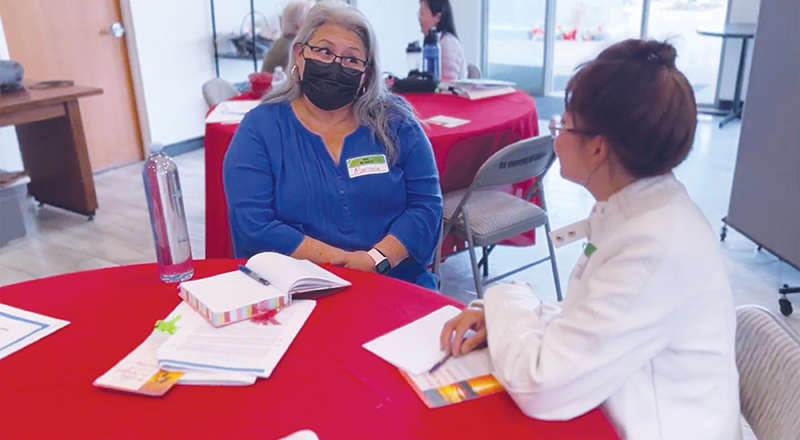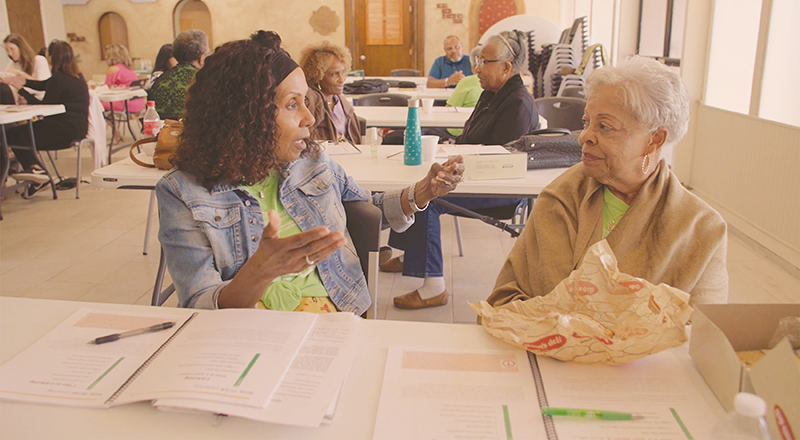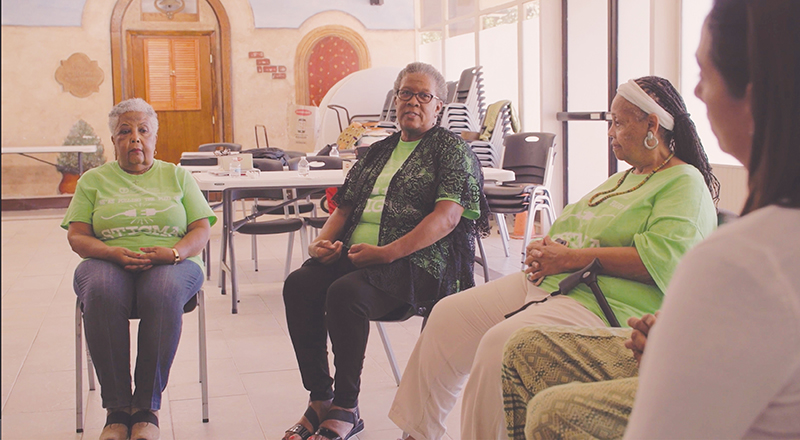
Our Mother of Mercy Catholic Church in Houston is among the parishes that have formed mental health ministries. Here, from left, Eva Mathews, Lucille Ford and Claire Shynett take part in a program called Healing Circle. Shynett is her church's mental health ministry coordinator.
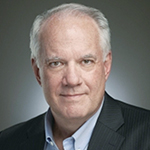
When Deacon Ed Shoener's daughter Katie made her first suicide attempt in 2005, his parish church "was the last place" he would have gone for help, he says. "The church didn't know what to do," he explains, when it came to supporting people with mental illness and their families.
He hopes the Association of Catholic Mental Health Ministers is changing that. The association offers parishes training, resources and connections to provide meaningful support to people who have mental illness. Any parish can access the association's resources.
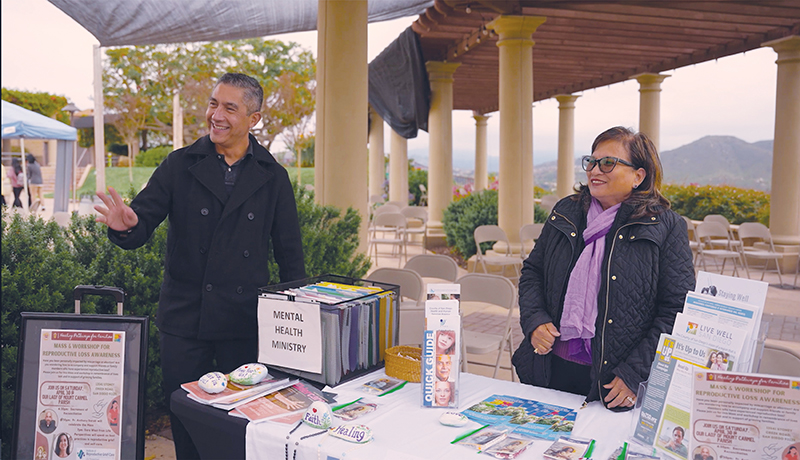
As part of their work with a mental health ministry at Our Lady of Mount Carmel Parish in San Diego, Laurie Dusa and Esteban Quintana offer mental health resources outside the church. Dusa is a mental health ministry volunteer coordinator and Quintana is a consultant and ministry volunteer with the church's program.
Deacon Shoener partnered in founding the association in 2019, three years after his daughter took her own life at the age of 29.
Since the association's launch, about 2,700 people have accessed its services and resources. About 50 or 60 dioceses across the U.S. are represented in the informal network, as well as dioceses from 40 to 50 other countries. Hundreds of parishes within those U.S. dioceses have developed mental health ministries with the association's support.
Deacon Shoener's dream is that someday every parish across the U.S. will offer a mental health ministry. He says, "Ours is a really new ministry, but a core part of our ministry is to have (people impacted by mental illness) reassured that they are loved by God, that they are not abandoned, that they are not alone. Ours is a ministry that is about accompanying people."
Widespread mental illness
According to statistics from the National Alliance on Mental Illness, 22.8%
of U.S. adults experienced mental illness in 2021 and 16.5% of U.S. youth aged 6 to 17 experienced a mental health disorder in 2016. Yet, for both the adults and youth, only about half received treatment. Further, mental illness can be linked with
suicide.
NAMI says suicide is the second leading cause of death among people aged 10 to 14 and the third leading cause of
death among those aged 15 to 24.
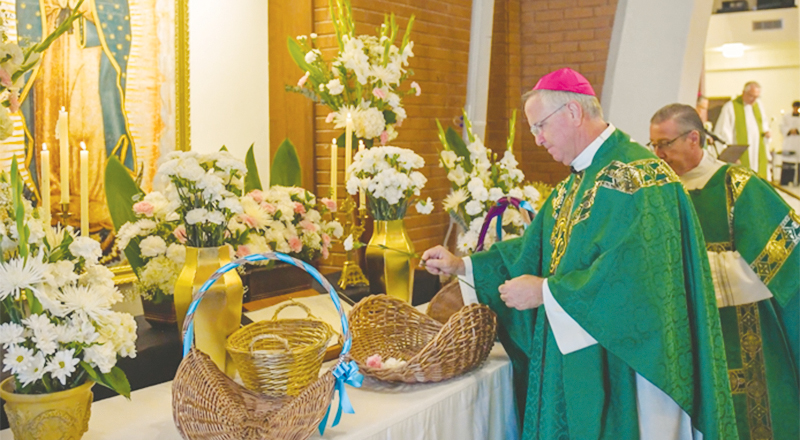
Bishop John Dolan helped establish mental health ministries in the Diocese of Phoenix. Here, at a Mass for survivors of suicide at a Phoenix church, Bishop Dolan joins a procession of participants who brought flowers in honor of loved ones lost to suicide. It is estimated that more than 1,000 people attended the service or viewed it online.
Even though mental illness is pervasive across the U.S., few parishes seemed to be prepared to address it effectively in the past, says Deacon Shoener, who lives in Scranton, Pennsylvania. Decades ago, when his daughter was struggling with bipolar disorder, there was a heavy stigma about mental illness — it often went undiscussed in and unaddressed by parishes. "When our daughter was diagnosed, we were worried — we didn't want people to know, but we later learned many people were in the same situation," Deacon Shoener says.
He adds that Catholic clergy do not always receive comprehensive training in mental health care. And, hospital chaplains are not required to receive extensive training in mental illness either, though efforts are underway to increase the training available to them. For instance, the University of San Diego has established the Catholic Institute for Mental Health Ministry that offers a behavioral health certificate for chaplains.
'Fear, ignorance and hurtful attitudes'
When his daughter died, Deacon Shoener wrote a profoundly personal and heartfelt obituary for
the
Scranton Times-Tribune that spoke to the damaging way that people talk about those with mental illness. In part he wrote that, "in the case of mental illness there is so much fear, ignorance and hurtful attitudes that the people who
suffer from mental illness needlessly suffer further." He decried how society derogatively labels people who are mentally ill and how it fails to appropriately address mental illness.
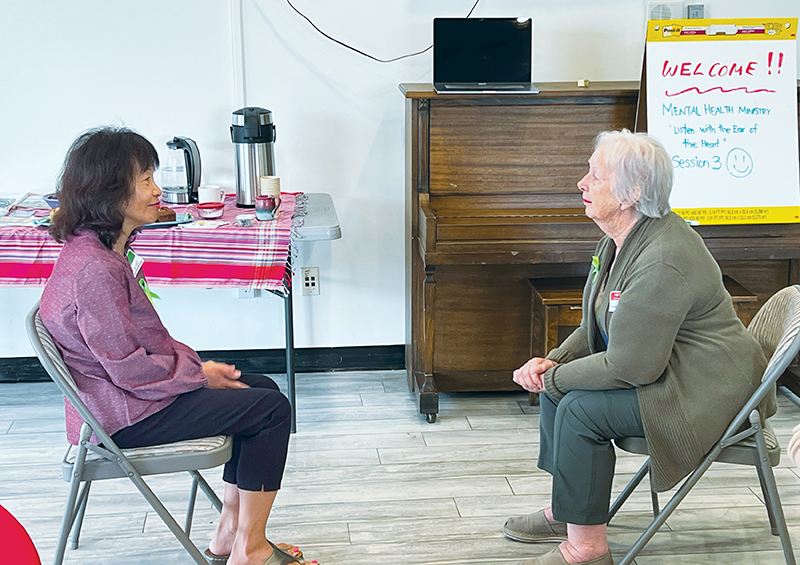
Veneranda Reyes, at left, and Louise Conners take part in a mental health ministry program offered by the St. Francis of Assisi Parish in San Jose, California.
"Please know that Katie was a sweet, wonderful person that loved life, the people around her — and Jesus Christ," he wrote.
Hundreds of thousands of people reacted to the obituary online and many reached out directly to Deacon Shoener. Some of the people who contacted him shared that their parishes were trying in isolation to address mental health.
It was evident there was a need for a more intentional, interconnected church effort, says Deacon Shoener. He says with a laugh that the overwhelming response to the obituary "was God's way to get this hard-headed guy from Scranton to do something."
A hunger for this ministry
Conversations that followed the obituary posting led to Deacon Shoener connecting with Bishop John Dolan, who was the auxiliary bishop for the San Diego diocese at that time and has since become bishop
of the Diocese of Phoenix. Bishop Dolan has a passion for aiding people who have mental illness — his family has lost three siblings and a brother-in-law to suicide. He had been implementing a mental health ministry in the San Diego diocese.
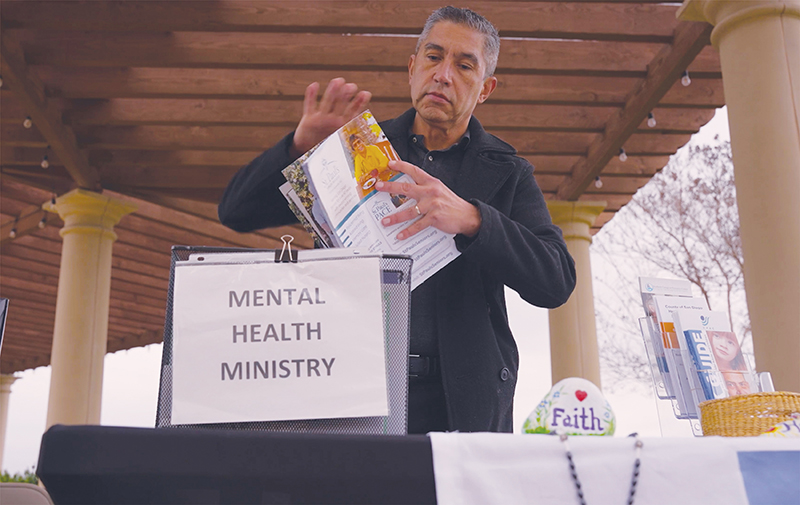
Quintana prepares the materials he was helping to distribute on mental health awareness at Our Lady of Mount Carmel.
When they connected, Bishop Dolan and Deacon Shoener first focused on establishing the Catholic Institute for Mental Health Ministry at the Catholic University of San Diego. Launched in 2017, that institute develops mental health ministry training and education resources. After establishing the institute, Bishop Dolan and Deacon Shoener discussed the need for developing a broader, more comprehensive approach to ensure more dioceses and parishes had the resources to start their own ministries or to bolster the programs they already had launched.
The two men formed an advisory group of people with experience in mental health ministry. That group created the Association of Catholic Mental Health Ministers. Deacon Shoener is president of the association and heads a nine-member board that includes Bishop Dolan. The association has a four-member staff. It is funded by private donations.
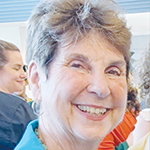
The association has gathered concepts from existing parish programs and developed training curriculum and materials. Parishes that wish to start a mental health ministry are encouraged to designate a point person and assemble a team to support the work. Once a parish program is built, those heading the program recruit parishioners to complete the training. The goal is to have numerous parishioners aware of the importance of mental wellness, know how best to approach those who are in need and offer support, and then be able to accompany them. That could include praying with them, keeping the conversation going over time to provide companionship, and pointing them to mental health resources and providers. Parishioners are not expected to provide mental health counseling or therapy themselves.
Growing network
The association holds networking calls and conferences and soon will begin hosting regional meetings. Deacon Shoener says the quick spread and uptake of the association's programming indicates that "people are
hungry for" this type of ministry.
Barbara Zahner is a founding member of the association and also helped start mental health ministries in her home diocese of San Jose, California. A board-certified chaplain with experience in hospitals and hospices as well as nonprofit leadership, she says there is a national epidemic of loneliness and well-documented mental health challenges. She says these parish ministries can help parishioners be Christlike to people experiencing mental distress.
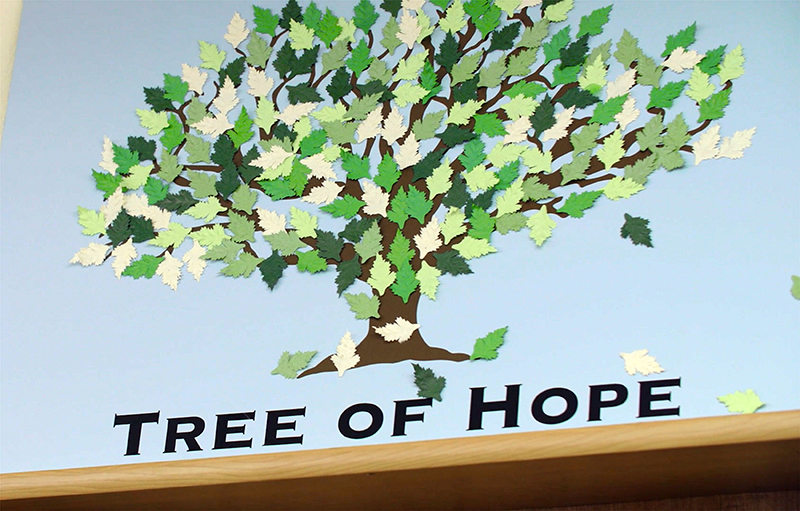
Saint Joachim Parish in Costa Mesa, California, has a mental health ministry, and this "Tree of Hope" is a representation of the work that is happening through the program.
She notes that she sees a natural connection between these parish programs and Catholic health facilities, and it would be good for them to work together. For instance, given that hospital discharge can be scary for people with mental illness and for people who lack support at home, Zahner says hospitals could work with parish mental health ministries. The ministries could link hospital patients being discharged home to a parish with parishioners who have been trained through the association's programs.
Paraphrasing the head of the nonprofit Los Angeles-based Homeboy Industries, a nonprofit focused on gang intervention, Zahner says, "People long to be safe, seen and cherished," and she says the parish ministries can help.
» You Are Not Alone: Statistics from The National Alliance on Mental Illness

